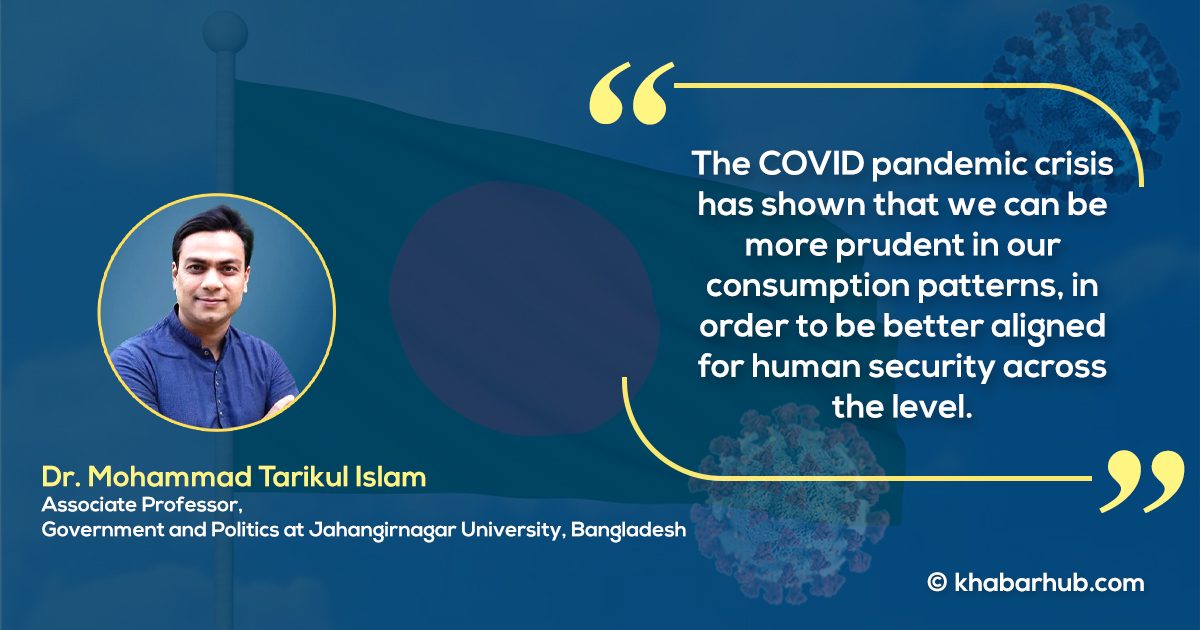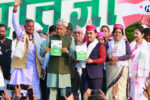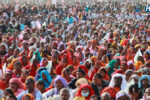COVID-19 has posed a serious threat towards the existence of human beings on an unprecedented scale with ruthless and remorseless efficiency.
Subsequently, virtually all countries have been deployed possible best efforts to try and halt the spread of the pandemic at an enormous social and economic cost.
The evolving crisis has been characterized by politicians, scholars and media organizations as the most perilous threat to human progress, peace, prosperity and stability since the Second World War.
The crisis enables us to rethink uplifting human security in the lives of the people and not in the weapons that states have.
In order to overcome the crisis, a social safety net for people impoverished and marginalized by sudden and severe health and economic crises is the demand of time.
In this article, I will converse the deadly impact of COVID pandemic on the life and livelihood of the rural dwellers in Bangladesh explaining the current state of human security.
The COVID-19 induced lockdown struck livelihood choices because of social distancing, breakdown in logistics and storage facilities, scarcity of laborers, etc.
It is apparent that the national disaster management institutional structure recognizes the importance of the institutional presence up to the local level for comprehensive disaster management.
And these have resulted in a stunning production, price distortions, and uncertain living conditions of the rural lower-income people.
In the wake of the COVID pandemic, people-centered development is the core of discourse as this approach appeared in the cutting edge of international development discourse focusing on self-belief, self-reliance, and community living with the spirit of togetherness, social justice, and participatory decision-making.
Unfortunately, it is missing in the context of rural Bangladesh as a top-down approach to dent the credibility of local authorities in safeguarding human security amidst the COVID pandemic.
As COVID-19 topples lives and livelihoods across the country particularly in the rural areas of Bangladesh, Bangladesh government must stress a range of multilateral solutions to ease the pandemic, while also getting back on track towards achieving sustainable and equitable development.
Human Security, a non-traditional security approach, generally refers to the survival of individuals, communities, and even the global world.
Without a doubt, human security has been the emerging paradigm for understanding global vulnerabilities whose proponents challenge the traditional notion of national security by arguing that the proper referent for security should be the individual rather than the state.
Apparently, the long experiences of rural community development in Bangladesh led to not only socio-economic improvement but had implications for social, economic and environmental systems.
This economic downward spiral can raze all the success Bangladesh achieved in taking down its poverty rate to 20.5% over the last decades.
In Bangladesh, although the contribution of agriculture to GDP has gradually declined to 14.10%, the agrarian society, which is mainly situated in rural Bangladesh, solely depends on agriculture for their livelihood, and the sector warranties the livelihood of 40.6% of the population.
Rural development in Bangladesh is found to be less progressive as most community-based organizations are reported to be inactive.
Besides, a lack of sense of belonging to development programs, increasing community dependency on external assistance and the absence of community perceived development have contributed to the underdevelopment, resulting in human insecurity in rural Bangladesh.
The population of rural Bangladesh faces critical issues of social, economic, and environmental sustainability such as a significant decrease in water supply caused by a significant loss of water resources, recurrent natural disasters and probable impact of climate change.
These issues lead to significant threats to agricultural and community livelihood. As the source of income for the majority of the rural workers and farmers is affected by the COVID pandemic, most of them require food and medicine support.
In order to resume their agricultural affairs, many of the marginal farmers need cash grants support while low-interest loans as preparation for restarting work is also required as soon as the situation gets better.
The food security situation in rural Bangladesh over the years has improved far and further improvements on access and utilization, to be sustainable and large-scale, need renewed efforts from the government, civil society organizations and the development partners.
Bangladesh is a disaster-prone country and disaster vulnerability possesses a threat to human security. Human security is at risk as disaster renders the community without food or shelter, impoverished, diseased, and displaced and it is happening again this year because of prolonged flooding in the northern part of Bangladesh.
With the fight against the COVID-19 pandemic aside, Bangladesh is also struggling to face the flash floods and meanwhile, week-long floods, which are expected to be severe in some parts of the country in the upcoming days, have already affected more than 2 million people, forcing more than 20,000 to leave their homes and to take shelter in government-provided facilities in northern areas.
It is apparent that the national disaster management institutional structure recognizes the importance of the institutional presence up to the local level for comprehensive disaster management.
Union Parishad Disaster Management Committee, an ideal platform at the heart of community people, has underperformed on account of incompetence of local elected representatives.
In the context of rural Bangladesh, environmental degradation is a particular case of consumption or production externalities reflected by the divergence between private and social costs (or benefits).
Union Parishad over the years has been confronted with numerous problems, which upshots poor management of environmental security in rural Bangladesh.
The government of Bangladesh is striving hard to ensure access to its rural population to basic health care and health services by the way of setting up a primary health care center.
The pandemic has shown us the importance of being prepared collectively when crises hit. Only such an approach can deliver win-win policies for changing the fate of the vulnerable communities in rural Bangladesh.
The role of NGOs, particularly BRAC, in promoting primary health services for mothers and children is notable.
One of its responsibilities involves providing health security to the rural population, which is a challenging task given that only 30 percent of Bangladeshis live in cities and there are limited infrastructure and a lack of health professionals in rural areas.
The food security situation in rural Bangladesh over the years has improved far and further improvements on access and utilization, to be sustainable and large-scale, need renewed efforts from the government, civil society organizations and the development partners.
Issues of governance and accountability further thwart attempts to provide targeted safety nets and price stabilization, particularly in the post-COVID pandemic.
In truth, Union Parishad (the lowest tier of the local government bodies) is supposed to play a significant role in ensuring human security for the people living in rural Bangladesh, but corruption, poor governance and lack of accountability are the common scenarios in social safety net programs like Vulnerable Group Development (VGD), Vulnerable Group Feeding (VGF), Old-age Allowance, Widow Allowance, and Disability Allowance.
Serious attention to be paid making sure that vulnerable section in the rural areas has fair access to these packages without any impediment.
Let the local community lead and master the social changes. While NGOs are still likely to be most concerned with the essentials of improving human development, becoming involved in human security initiatives helps to strengthen them as organizations and to reinforce and extend the contribution that they are able to make to the people with whom they already work.
Furthermore, to make the development truly meaningful, involving people directly in the formulation and implementation of decisions has been the demand of the hour. This necessitates the decentralization of democracy to the lowest level.
What we perceive, at last, there is a need for a paradigm shift in the government side, from imposing development to facilitating rural development, from teaching the local people, to learning together with them.
Let political parties and relevant stakeholders including community people take the lessons from the problems and overcome them for the greater interest of the nation.
The pandemic has shown us the importance of being prepared collectively when crises hit. Only such an approach can deliver win-win policies for changing the fate of the vulnerable communities in rural Bangladesh.
This pandemic provides us with the opportunity to take a comprehensive look at the human security of the rural dwellers, at the way they interact and create more resilient societies emphasizing a multi-stakeholder approach to invest more for sustainable and equitable development.
The COVID pandemic crisis has shown that we can be more prudent in our consumption patterns, in order to be better aligned for human security across the level.
What we perceive, at last, there is a need for a paradigm shift in the government side, from imposing development to facilitating rural development, from teaching the local people, to learning together with them.
Mainstreaming human security to the existing rural development approach is a must to counteract the adverse impact of COVID on the lives and livelihood of the rural dwellers.
(Dr. Mohammad Tarikul Islam is an Associate Professor in Government and Politics, Jahangirnagar University, Bangladesh)









Comment